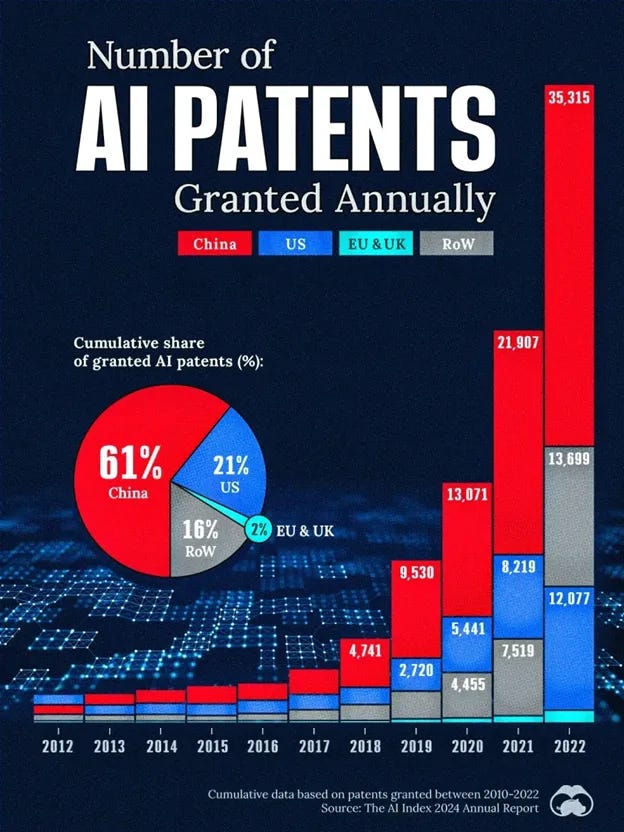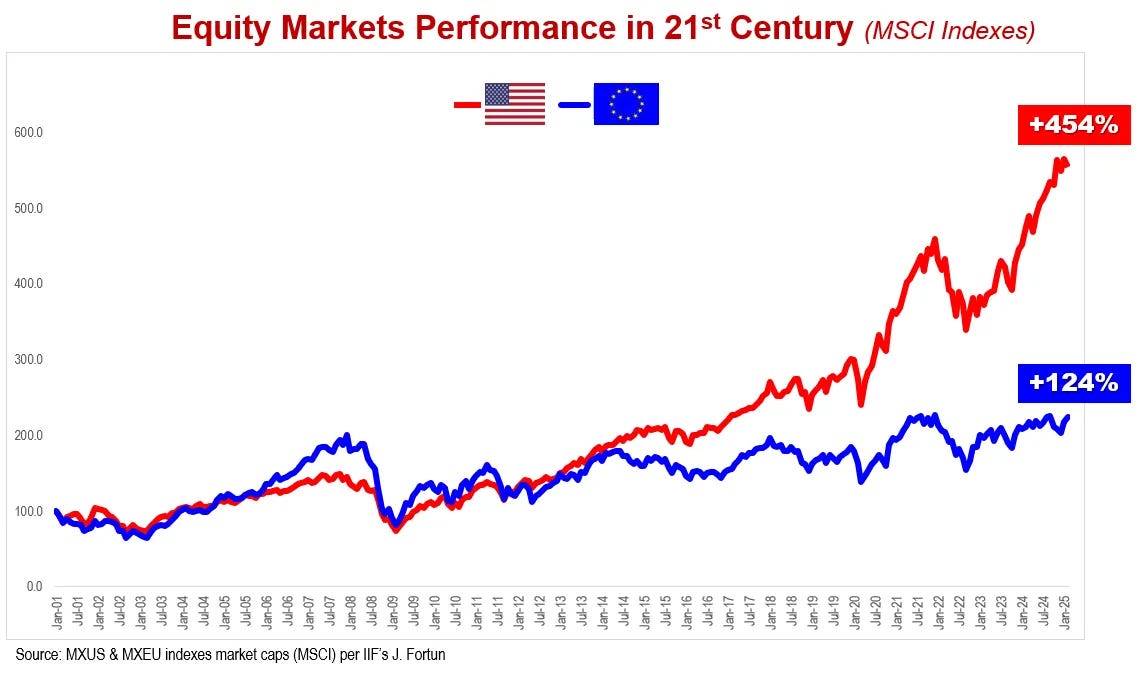Team Trump’s chaos is a well worked plan
The old international order is over. Understanding why is our guide to this change. It's time to take The Sniff Test.
A Time for Change
Nineteenth century historians championed the idea that great leaders shape the welfare of nations. Modern understanding is that economies and societies are too complex and intertwined to bend to a single person’s will. Instead, when the time is ripe for change, change-makers appear.
Reagan and Thatcher brought fringe theories to the mainstream. Industries were uprooted, international relations reimagined, and individualism unleashed. Most adjusted, many didn’t and the first half of the 1980s was a time of turmoil.
Today, the post-war consensus is broken. Some stress over excessive debts, others environmental disaster, and there is profound uncertainty over how artificial intelligence will change our lives. Most immediate and disturbing, America is no longer the protector of global freedom.
Every nation acts in its own interest. Alliances last only as long as they suit a purpose. The administration is acting before overreach and overspending cause a loss of empire.
This is the end of the post war period, rather than the beginning of a new one. America as a great power, but not a good one, is the agent of change. The values that will shape the rest of the century are as yet undiscovered.
It’s a mistake to see Trump’s tariff hokey-cokey and the on-off negotiations with Ukraine as chaos at the heart of government. Team Trump knows what it wants, why it matters, and how they want to do it. They see the times as ripe for change and are taking us with them, for better or worse.
China is the Catalyst
The world that emerged blinking from the wreckage of World War II was unlike any before. Two military superpowers faced off in Europe while skirmishing in hotspots around the globe. Only one was an economic superpower and it emerged victorious. The lesson was clear.
The free flow of capital, the promotion of international trade, private enterprise and a financial system centred on the dollar, are central to American hegemony. The US is the world’s consumer and the world recycles dollars through New York.
US corporations outsource supply chains to low cost locations. America is on top because its design and marketing book-ends the productive process. Lesser nations must fight for the lower margin middle.
A quarter of a century ago China burst into the frame. At first it was welcomed as an endless supply of cheap labour, accompanied by the narrative that wealth would make it more democratic. That dream soured a decade ago, as the US realised China is relentless in its pursuit of pole position. The diplomatic rhetoric heated up, while the business world continued as if nothing had changed.
It has changed now. The US remains dominant, but feels its vulnerability. Team Trump struts the global stage, dispensing what some call gangster diplomacy, while scrabbling to remake an economic order that has slipped from its control. They view inaction as tantamount to defeat.
The Purpose of Team Trump’s Foreign Policy
Russia could provide the food and fuel that China lacks and an alliance of the two must be stopped. Europe is the natural market for Russian surplus but, in Team Trump’s eyes, is blind to its weakness. It waves the flag of freedom from behind US military cover and must be forced to front up to Putin. US policy is always to avoid a hegemonic continental power, just as it was Britain’s priority when it ruled the waves.
Everywhere we see a strategy of forcing countries to face their failings, as the US faces its own. Zelensky is humiliated because he touted the old line, harked back to Biden and thought Team Trump cared that he had Europe’s backing. Yet he is too valuable an asset to cut free, because Ukraine’s rich resources can plug a hole in US supply chains.
Trump’s design for Gaza is reviled in the Arab world, which is forced to assume responsibility. The Arab League met in Cairo last week, with the notable absence of leaders from its richest members. It repeated a stance that has been rejected since first emerging from the 1982 Morocco summit. The Middle East is not Ukraine and the Gaza conflict reaches deep into US domestic politics. Nonetheless, the message to the Arab world to find a path to peace is the same. Israel receives full backing until this is delivered.
Even the closest allies of the US are placed under strain. Free trade between the US, Canada and Mexico is a great success, but too often provides a backdoor for Chinese exports that leave America vulnerable. The balancing act is to leave this door ajar only as long as it is necessary. Canada now has a globalist leader steeped in old world intricacies, and the spat with the US is rescuing the Liberal party’s erstwhile forlorn electoral prospects. Mark Carney versus Team Trump will be compulsive viewing.
Foreign policy is determined by the domestic imperative. The US is special because its imperative involves being the world’s preeminent economy. China has unpicked the underbelly of its advantage and Team Trump is conducting emergency repairs. This means truncating the global supply chains that start in China.
Redirecting Federal Spending
China produces 70% of the rare earth materials required to enable most advanced technology. Decades of investing in Africa leave it controlling 90% of rare earth processing. The US may block the export of high-tech product to China, but China might stop it being made in the first place.
The Ukraine has some of the missing materials, as do Canada, the Artic and Greenland. What may be seen as outbursts, are in fact choreographed steps in a new diplomacy. It was Covid that blew a hole in international supply chains. While many assume we’ll go back to what went before, Team Trump seizes its opportunity.
A standard response is “We’re all grown ups, dependent on each other, can’t we just get along?” This ignores the historical imperative. Britain overcame France and Spain, Germany overhauled Britain, and the US outgrew Germany. Now China casts the shade.
Technology, and AI in particular, are central to the conflict. The US owns advanced chips while Taiwan makes them. Chinese authors published double the research of US counterparts from 2018-23 and co-authored half of the most cited papers. This presents a way to undermine US technological advantage.
China can undermine the profit-driven US business model by making AI open source. OpenAI talks of assistants priced from $2,000 to $20,000 a month. Manus AI lets you try agentic workflows for free. When information is public, knowledge is no longer a barrier protecting profits.
Technologists and environmentalists are closer than it seems. Renewable energy is important to power the huge future demand for computing, but in a supportive role rather than an end in itself. Environmentalists who want to make a difference should get onboard.
I debated with a friend why the Democrats must compromise rather than fight Trump at every turn. A focused economic agenda, with international political ramifications and a populist message at home, drives a truck through a broad liberal programme in which the loudest voices are outside the Overton Window. Refighting the last election is a losing strategy.
Team Trump is not without its petty politics. Biden issued 162 executive orders, revoking 72 of the 220 issued in Trump’s first term. 67 of Biden’s have already been revoked.
A smart environmentalist with a plan to preserve Greenland’s resources told me this week we cannot afford to spend trillions on green projects. The money to pay for these would be earned by burning trillions of dollars of fossil fuels. This logic is not why Trump issues executive orders or unleashes DOGE, but they are redirecting federal spending all the same.
A Business Takeover of Government
Between October 2024 and January this year, the annual federal budget deficit jumped by half, to three quarters of a trillion dollars. Much of this was sanctioned spending rushed out the door before Trump’s arrival. This is an obvious place to make savings before the money seeps into the system.
This is why people on probation in federal departments were first to go. It’s why the Department of Justice investigates $20 billion of payments to eight non-government agencies. It is also why services are stopped to search for the loot.
This is businessmen enacting standard practice in a takeover. Cut first, question later, because the easy wins are not enough to make a difference. You only find out what matters when people scream about it.
Washington D.C. is screaming. Only three tech cities on the West Coast have higher income per person than the capital. It specialises in government administration, consulting, legal and lobbying. There are spin offs in education and research, media, real estate and hospitality. There are startups working on government projects in healthcare and technology. All depend on government and are hurting.
D.C. is not the US. Five million people move jobs every month, making 300,000 federal workers a rounding error. The other people are Trump’s supporters. They don’t fret over their minimal pensions, or own their own homes, and won’t worry if the stock market falls. This time, he’ll worry much less too, which is unnerving investors and presenting an opportunity.
It’s Coming Home
The post war period of America as the guardian of international freedom is over. The challenge from China rejecting this world is too great. Team Trump turns all hands to the pump to preserve US primacy.
This means significant upheaval for clients of the old order, whether companies or countries. Team Trump expects them to stand on their own two feet, because America no longer has the resources to prop them up. This requires money, much of which might be squirreled away in US capital markets.
If so, to coin a phrase from football (which is not investment advice), “It’s coming home”.







